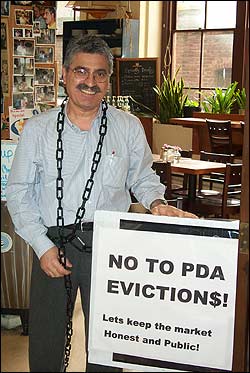Why did the cafe owner chain himself to a pole? It’s not a joke. On Feb. 1, Ramazan Senturk, proprietor of the No Boundaries Cafe in Pike Place Market’s Economy Building, wrapped one end of a black chain around his aproned waist and the other around a wooden column in his Mediterranean soup-and-sandwich shop to protest his pending eviction. Meanwhile, No Boundaries, which the Turkish immigrant established in 1998, remained open for business, in violation of an eviction warning from the Market’s Preservation and Development Authority (PDA).
In November, the PDA formally ended Senturk’s tenancy based on infractions that included 20 late rent payments, a dozen bounced checks, and nine security reports concerning “aggressive behavior” toward Michael Yaeger’s Studio Solstone, which sells watercolor art. (Senturk says Yaeger’s cashier kiosk had frequently blocked the entrance to No Boundaries, and repeated calls for PDA help to resolve the conflict were unanswered.)
Senturk concedes he hasn’t been a perfect tenant. But his situation has added fuel to a fiery debate among Pike Place merchants and customers about the Market’s mission. First Avenue gallery owner Billy King, a frequent No Boundaries patron, claims the Market was founded as a “home for difficult people,” as he put it in a recent e-mail to interim PDA director Carol Binder. Some Market merchants will inevitably struggle financially, King says, because they’re “small and marginal,” a phrase used in the PDA’s 1973 charter to describe the kinds of businesses it’s meant to support. Replying to King via e-mail, Binder insisted that the PDA’s rent rates and collection policies are “lenient and understanding” but that “Pike Place Market simply cannot afford to devote the money, time, resources, and energy to keeping an irresponsible business owner in the market.”
According to Stephanie Cirkovich, the PDA’s director of marketing and communications, Senturk paid no rent during the first three months of 2004, which prompted the organization to file the first eviction warning. This action resulted in $2,000 in legal fees, which Senturk, per the terms of his lease, was required to pay. He refused. Cirkovich says he eventually settled that debt and was on time with rent last summer. But he was falling behind again by midautumn.
For his part, Senturk claims the PDA has falsely stated that it offered him assistance during hard times, but that no help was actually forthcoming. “I’m a decent operator, and I admit that I might have [made] some mistakes, but I recognize where I did the mistakes,” he says.
Having invested some $170,000 in No Boundaries, he considers it his right to be able to sell the cafe. Cirkovich disagrees. “Ramazan can still sell his business, albeit the equipment and his recipes. He just can’t sell Pike Place Market property. Nor can he sell his lease, which technically no longer exists.” Senturk scoffs at Cirkovich’s suggestion. “That is ridiculous. My equipment [is] worth something in here, because they installed it here. I have custom-made counters and this and that. They have value within the business, within the space. It’s worthless when they are out of here.”
Senturk and representatives of the PDA are scheduled to appear in King County Superior Court on Thursday, Feb. 10, to argue their case. Meantime, Senturk spends each day chained to his cafe, shaking the hands of well-wishers and awaiting its fate.









